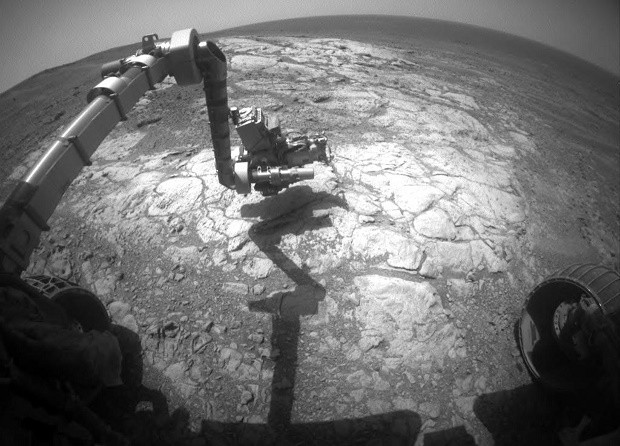NASA officials have announced that its Mars rover, Opportunity is suffering once more from electronic memory lapses.
After NASA engineers reformatted its flash memory, this latest batch of issues resurfaced in the first week after the repairs on the mobile lab on Mars. Scientists have decided to attempt to fix this recurring problem to further reduce periodic memory lapses and issues that have been ailing the 12 year old rover.
Opportunity's flash memory is where data is stored during the night when its systems hibernate to preserve solar energy gathered by the solar panels during the day. There are seven flash memory banks aboard the rover where mission engineers rerouted data away from these banks last December 2014. This required data to be stored in its in volatile memory that needs energy to operate.
The team have decided to re-establish the flash memory systems to re-engage it back to life however, only six out of the several banks went back online where prior recurring memory problems apparently originated from the seventh memory bank and the cause is still unknown.
Opportunity was designed to just last for 90 days on the Red Planet where it was launched on July 2003, landing on Mars on Janaury 2004. After more than 11 years, the rover is still continuing to explore the Martian terrain and sending back images of the alien world.
NASA announced that Opportunity was also the first man made vehicle to travel the longest distance on the surface of an alien world. To date, the rover is examining outcrops found on the west rim of Endeavour Crater in Marathon Valley. NASA's Mars Reconnaissance Orbiter confirmed the presence of clay minerals that suggest the presence of liquid water.
Opportunity's twin rover, Spirit, also landed on Mars weeks before and also exceeded its lfe expectancy as it transmitted precious data back to Earth for six years before its batteries went dead. These two rovers have since then detected pivotal evidence of water on Mars from its ancient past.
NASA also believes that these rovers also help in paving way for the first human colonies on Mars set on 2030.
During the end of last year, Opportunity experienced several occurences of amnesia that made mission engineers decide to modify this by using its volatile memory in the meantime. However, this strategy will not work for long since it is similar to storing data to a desktop computer's RAM where it will lose all data when it shuts down.
Fortunately, this last memory lapse did not cause any data loss according to mission engineers where the rover is now headed to its next exploration point, a Martian rock called Athens.



























